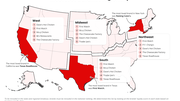A View From The Top
How the Biden administration may change the restaurant industry
Aaron Noveshen, CEO of Starbird and the Culinary Edge, weighs in on how the industry will fare under President-elect Joe Biden.

December 3, 2020
By Aaron Noveshen, CEO of Starbird and the Culinary Edge
It's been three weeks since the much-anticipated presidential election and while the dust hasn't fully settled, The Culinary Edge has already begun to anticipate what changes the F&B industry can expect in the term ahead.
There are few predictions that can't be forecasted through the lens of the ongoing COVID-19 pandemic, so this is where our interrogation begins. How will restaurants continue to rebound from a general lack of economic prosperity coupled with limiting on-premise dining regulations? President-elect Biden has called for PPP reform, specifically prohibiting access to private equity firms and hedge funds, while also broadening provisions for small and minority-owned businesses.
In an effort to stimulate the economy in the short term and, hopefully, minimize economic disparities in the future, President-elect Biden has repeatedly voiced support for raising the federal minimum wage to $15 an hour, which is more than double the current rate of $7.25. There's no doubt that this would be a boon for workers, yet we imagine that this might necessitate some unfortunate cost-cutting measures from restaurant owners and operators, less federal assistance is garnered as we recover from the tremendous loss of income caused by COVID-19.
While immigration debate was a centerpiece of the 2016 election, this year, it appears to have taken a back seat to other issues, notably the economy and the coronavirus pandemic as outlined above. And yet, immigration policy will continue to have a significant impact on the restaurant industry. During the past four years, many restaurants struggled to align with President Trump's aggressive stance on immigration, which he pledged to intensify in a second term.
President-elect Biden, however, believes that "it is long past time to provide a roadmap to citizenship for the millions of undocumented workers, caregivers, students, and children who are an essential part of our economy and of the fabric of our nation." For many U.S. residents already making tremendous contributions to the F&B industry, this could be a path to sustained prosperity.
Finally, President-elect Biden campaigned on a commitment to carbon-neutrality, particularly in the agriculture sector. He has positioned his support behind ethanol, biofuels, and rural broadband to assist in precision agriculture. And while this will have meaningful effects at the beginning of the food supply chain, Biden has also intimated that restaurants will have a part to play by switching to renewable energy, eschewing plastic, and sourcing sustainably raised meat all in an effort to reach carbon neutrality. We've already begun to see restaurants assigning emissions scores to various menu items, in the same way we saw calorie counts appear as menu footnotes as early as 2008.
It will take several years to fully realize the effects of some of President-elect Biden's proposals, but for F&B brands who want to stay competitive as it plays out, we advise that restaurants design their innovation roadmap to include considerations for PPP stimulation, higher labor costs, and carbon-neutrality strategies.
Editor's note: A View From the Top is a series featuring first-person accounts from some of the fast casual industry's most innovative leaders. If you are interested in being featured, send email to editor@FastCasual.com












